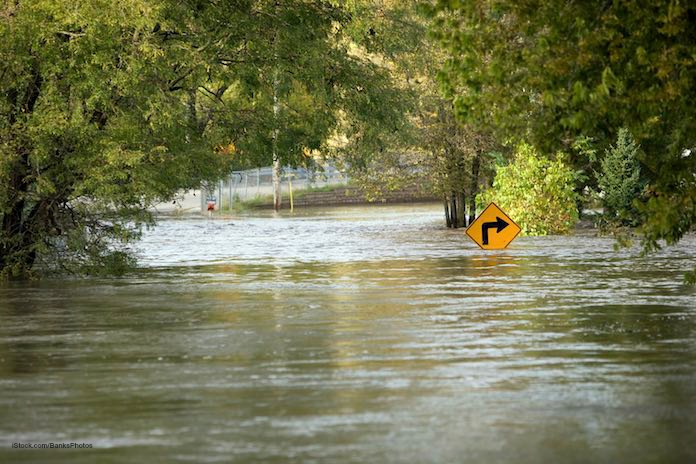The FDA is offering food safety and water safety advice for anyone affected by Hurricane Harvey in Texas. Food can be rendered unsafe by power outages and by contact with flood waters.

If the power went out and perishable food has been above 40°F for more than 2 hours (more than 1 hour if the air temperature is at 90°F or above) it must be discarded. Cooking won’t make this food safe, since bacteria can produce toxins that heat will not destroy. If the items stayed below 40°F and you are sure of this, cook them thoroughly to a safe minimum internal temperature before eating.
Once power has been restored, check the temperature of appliance thermometers in the freezer and fridge. If the thermometers are 40°F or below, the food in the freezer can be refrozen. If you didn’t have a thermometer, if the food still has ice crystals or it is at 40°F or below, you can refreeze or cook it.
Refrigerated food is only safe if the power was out for less than 4 hours and the door was kept shut. Discard meat, poultry, fish, eggs, and leftovers that were at temps above 40°F for more than 2 hours.
If your home was flooded, do not eat any food that came into contact with flood water. Flood water is very dirty and can contain parasites, pathogenic bacteria, and harmful chemicals. Discard any food and beverage that was not in a waterproof container if there is any chance it touched flood water. Food containers that are waterproof include undamaged, commercially prepared food in metal cans and “retort pouches” such as flexible, shelf-stable juice or seafood pouches.
Non waterproof food containers include those with screw on caps, snap lids, pull tops, and crimped caps. Cardboard juice, milk, or baby formula boxes and home canned foods are not waterproof and should be thrown out. They can’t be effectively cleaned and sanitized.
Damaged cans of food must be discarded. Any cans with swelling, leakage, punctures, holes, fractures, deep rusting, or crushing/denting that prevents opening with a manual can opener are damaged.
Before using your kitchen again if it was flooded, wash metal pans, ceramic dishes, and utensils with soap and water, then sanitize by boiling in clean water for 15 minutes. You can also immerse them in a mild bleach solution for 15 minutes. Wash countertops with soap and water, using hot water, and sanitize with the bleach solution.
To save undamaged food packages exposed to flood water, first remove the labels, since they can harbor dirt and bacteria. Brush or wipe away dirt of silt, then thoroughly wash them. Sanitize the cans and retort pouches. Place in water, let the water come to a boil, and boil for 2 minutes, or put in a freshly made solution of 1 tablespoon liquid chlorine bleach to 1 gallon of drinking water for 15 minutes. Air dry these packages for a minimum of 1 hour before you store or open them. Relabel them with a marking pen. Use these products as soon as possible.
Only use water from a safe drinking source for drinking, washing, and preparing food. Use bottled water that has not been exposed to flood water. You can boil or disinfect water to make it safe for cleaning. First filter it if it’s cloudy. Then boil the water for 1 minute, let it cool, and store in clean containers. Or disinfect with bleach; this will kill some, but not all disease causing organisms. Add 8 drops of unscented, liquid chlorine bleach per gallon of water. Stir well and let stand for 30 minutes before you use it. If you have a well, make sure the water is teated and disinfected after flood waters recede.
Finally, make sure you know the symptoms of food poisoning, which can occur within a few minutes or up to 70 days after exposure to pathogens. Vomiting, diarrhea, abdominal pain, fever, headache, and body aches are all symptoms of food poisoning. If you are sick, see your doctor. Some people can suffer lifelong effects of food poisoning, including reactive arthritis, high blood pressure, irritable bowel syndrome, paralysis, and kidney failure.




